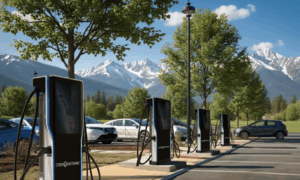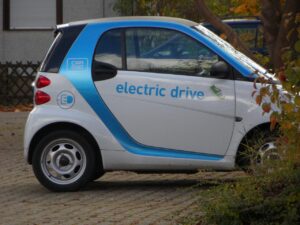
Home / EV Charging News / How Station Amperage and kW Impact EV Charging Speed
As electric vehicles (EVs) continue to grow in popularity, understanding the factors that influence charging speed is essential for EV owners. Two key factors that play a significant role in determining how quickly an EV can charge are the amperage of the charging station and the kilowatt (kW) rating. These elements are crucial in the efficiency and speed of charging, directly affecting how long it will take to recharge an EV’s battery. In this article, we’ll explore how station amperage and kW impact EV charging speed and why these factors matter for both current and prospective EV owners.
To fully grasp how these factors influence charging speed, it’s important to understand what amperage and kilowatts (kW) are and how they relate to electricity and charging.
Amperage, measured in amps (A), refers to the amount of electrical current flowing through a charging cable. In the context of EV charging, higher amperage means more current is available to charge the vehicle, which can result in faster charging times. However, the charging speed isn’t determined by amperage alone; it also depends on the voltage of the charging system and the vehicle’s capacity to handle the current.
Kilowatts are a measure of power, and in the context of EV charging, they indicate the rate at which energy is transferred to the vehicle’s battery. The kW rating of a charging station is calculated by multiplying the voltage (V) by the amperage (A). For example, a charging station operating at 240 volts with a 40-amp current delivers 9.6 kW of power (240V x 40A = 9.6 kW). The higher the kW rating, the more power is being delivered to the battery, and the faster the vehicle charges.
Amperage is a crucial factor in determining how quickly an EV can charge. Higher amperage allows more electrical current to flow into the vehicle’s battery, which can significantly reduce charging time. However, the maximum amperage that can be used depends on several factors:
For instance, if you have a charging station that provides 32 amps of current but your EV’s onboard charger can only handle 16 amps, the charging speed will be limited to what the vehicle can accept, regardless of the station’s capacity. Conversely, if both the station and the vehicle can handle higher amperage, you’ll experience faster charging times.
The kilowatt rating of a charging station directly affects how quickly your EV will charge. A higher kW rating means that more power is being delivered to the vehicle, resulting in a faster charge. The relationship between kW and charging time is generally straightforward: the higher the kW, the quicker the battery is replenished.
While both amperage and kW impact charging speed, they are interrelated. The kW rating is essentially a product of the amperage and voltage. Therefore, increasing the amperage at a given voltage will increase the kW, which in turn reduces the time needed to charge the vehicle.
However, there are practical limits to consider:
For EV owners, understanding how amperage and kW impact charging speed can help in choosing the right charging equipment and making informed decisions about where and when to charge. Here are some practical tips:
The amperage and kW rating of a charging station are critical factors that directly impact how quickly an electric vehicle can be charged. Higher amperage and kW ratings generally lead to faster charging times, but they must be matched with the vehicle’s capabilities and the electrical infrastructure. Understanding these factors allows EV owners to make informed decisions about their charging needs, ensuring they get the most efficient and effective charging experience possible. Whether you’re charging at home or on the go, knowing how these elements work together can help you optimize your EV’s charging process.



